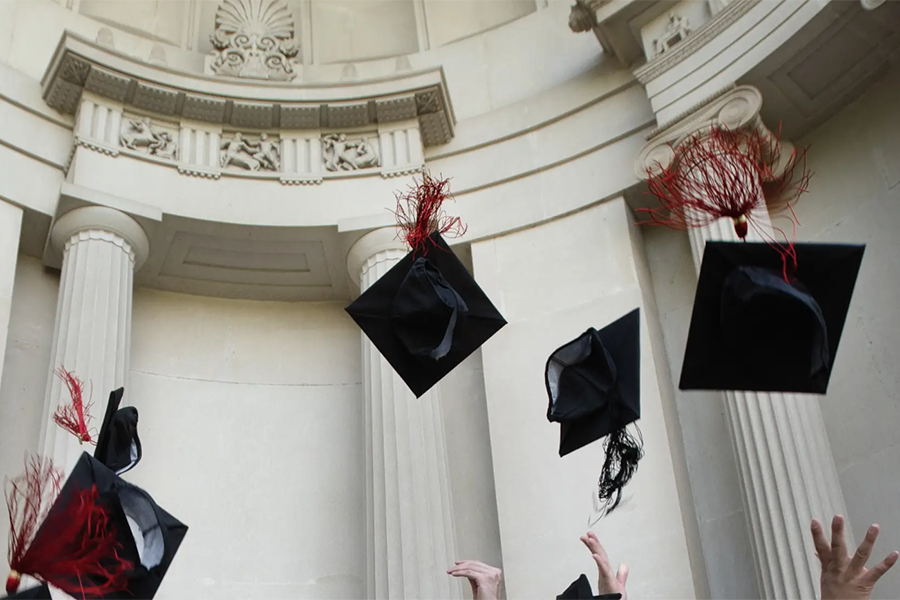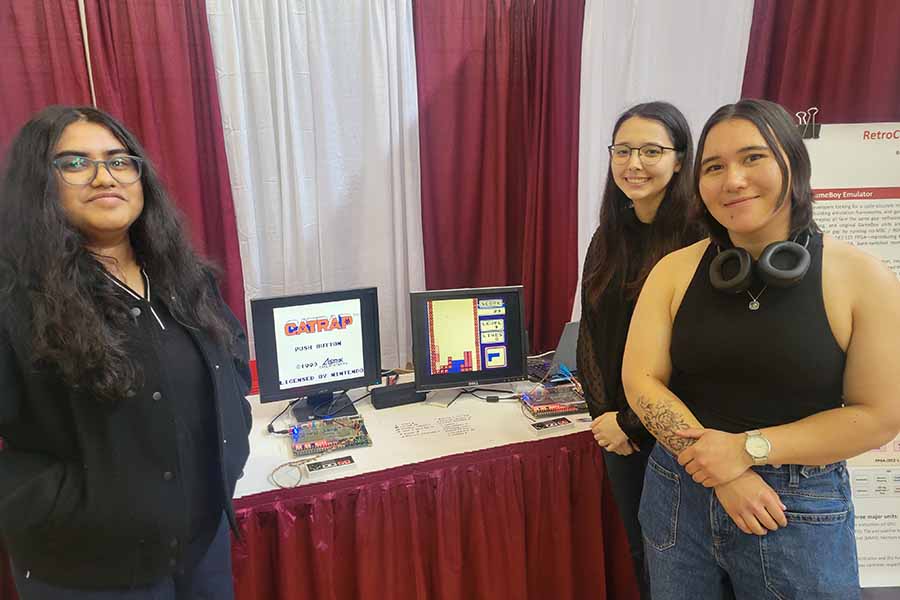
Recognizing Extraordinary Student Performance
By Staff writer
Each year, the electrical and computer engineering department recognizes extraordinary student performance during its annual undergraduate graduation ceremony.
Notably, this year, the department gave out not one, but two awards for best undergraduate senior project, as well as an award for the top undergraduate student. What's more–all of the recipients are women.
The E.M. Williams Award recognizes a graduating senior who has demonstrated superior scholastic achievement. This year, Katherine Parry won—the third female to do so in 13 years. Parry’s research focuses on how to design faster computers through non-traditional means, devising methods other than atom miniaturization to achieve computation speed, which is key to AI’s progression.
“This award means everything to me,” said Parry. “I put my all into doing well in my classes, and I was so happy that someone noticed what I was accomplishing. [I had a] very focused approach of getting everything I could out of my education. I [took] advantage of this rare opportunity while I had it. My secret to success was in finding the best study partners, a second set of eyes, to catch oversights and let me know when I misinterpreted a question. I also found it essential to be one of the first to complete homework.”
When Parry was 16, she discovered a more efficient way to calculate a square that saw her speak at a symposium in Kyoto, Japan, to the world's leading computer architects. From there, her future, as she put it, “took off.” Now, mere days after graduating with her bachelor’s, she is absorbed in her graduate career.
“I graduated on a Saturday and started my Ph.D. on Monday,” said Parry. “I was born for research. I always question if what I am being taught is really the right approach or might there be a better way. I have a long list of ideas on better ways of doing things that I placed on the back burner while I was doing my undergrad. Finally, I can explore these ideas in my Ph.D.”
Along with partners Bharathi Sridhar and Ruslana Fogler, Parry was also awarded the David Tuma Undergraduate Project Award, which honors the electrical and computer engineering student(s) with the most outstanding laboratory project of the year. Their project was titled “RetroCore: An FPGA-based GameBoy Emulator.”
“RetroCore is an FPGA-based Game Boy hardware emulator with a fully custom multi-color display and fully custom-built subsystems for the CPU, graphics, audio, memory, and input,” said Sridhar. “One of the biggest challenges was debugging the intricate interactions between these components, where even minor timing discrepancies could cause the entire system to fail. With no official specifications available for the original hardware, we relied entirely on community-sourced documentation. This made the design and validation process uniquely challenging and unlike any other project we had tackled before."
Sridhar, who will begin her master’s in the fall and whose hobbies include learning languages and painting, explained how she and her team got to this point.
“I’m really honored to have our work recognized with the David Tuma Award,” said Sridhar. “This project felt like the culmination of everything I’ve learned during my undergrad, from technical skills to collaboration and creative problem-solving. It was incredibly rewarding to apply all of that to something we cared about, and to have it recognized in this way means a lot.”
Fogler, who is planning to pursue a Ph.D. in computational imaging/graphics and participated in both the club tennis team and Women in ECE, feels similarly.
“I feel a lot of happy disbelief and an overwhelming sense of gratitude. When my partners and I picked this project, we knew that it would be a really motivating, exciting combination of our technical interests and a challenging goal to achieve. We had no clue that it would evolve into a first-place capstone project.”
A Goldwater Scholarship recipient, Parry, whose other interests include drawing and singing, emphasized that her and her partners’ unique synergy made everything possible.
“Ruslana, Bharathi, and I took on a very ambitious project,” she explained. “There is something beautiful about working together in a well-functioning team. Ruslana and Bharathi were incredible. Their diligence and resourcefulness resulted in our success. When you find a well-functioning team like ours, it is sad for life to split us up. We could accomplish so much together in the future.”
This year, the David Tuma Award also recognized a First Runner-Up: Amelia Lobo, Nancy Anderson, and Tanisha Sethi for their project “Enigma-18,” a working, modernized Enigma model inspired by the two WWII Enigma machines in the University Library’s Special Collections. Their open-source device runs on a Field-Programmable Gate Array, featuring a custom Printed Circuit Board for input/output.
Ultimately, for all these women, these awards mark both the end of an incredible four years and the beginning of many more to come.
